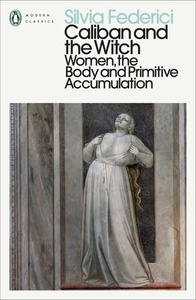Take a photo of a barcode or cover
informative
medium-paced
delicious book of the history of witchcraft and the persecution of women, and how it is correlated to the rise in capitalism
i dont really know... will rate later?
i greatly appreciate the writer's effort, i think it's such a cool take on marx's idea of primitive accumulation!!!, so important also. it did a great job at drawing parallels between sexuality, contraceptive rights, commons, gender, feudalism, mechanical philosophy, social reproduction, self-ownership, body/machine/self, etc. i think the author did great at making these timely as well. i think the first 2/3 were really really good. i started reading this early october, and i have thought aout the ideas expressed in this part of the book many times since reading it and i hope they will continue to inspire my thinking. though already alligning with my ethics, i learnt so much and i was very impressed by the way the author was ale to combine all this and this was super inspiring (and, as a woman, quite frustrating).
however, i also thought it could've used a little more editing. after these first 2/3, i think the book became slow and the ideas were more repetitive. i can see this becoming much more interesting with clearer editing and i'm unsure if i agree with the choices made in terms of the structuring of the different sections of the book. because of this, i wasn't able to focus as much, and i kept waiting for things that didn't really deliver. i guess it's okay that the book has a more academic tone, but for me reading this as a lighter read, this part just didn't really click and i wasn't able to enjoy this quite as much as i did the beginning.
i greatly appreciate the writer's effort, i think it's such a cool take on marx's idea of primitive accumulation!!!, so important also. it did a great job at drawing parallels between sexuality, contraceptive rights, commons, gender, feudalism, mechanical philosophy, social reproduction, self-ownership, body/machine/self, etc. i think the author did great at making these timely as well. i think the first 2/3 were really really good. i started reading this early october, and i have thought aout the ideas expressed in this part of the book many times since reading it and i hope they will continue to inspire my thinking. though already alligning with my ethics, i learnt so much and i was very impressed by the way the author was ale to combine all this and this was super inspiring (and, as a woman, quite frustrating).
however, i also thought it could've used a little more editing. after these first 2/3, i think the book became slow and the ideas were more repetitive. i can see this becoming much more interesting with clearer editing and i'm unsure if i agree with the choices made in terms of the structuring of the different sections of the book. because of this, i wasn't able to focus as much, and i kept waiting for things that didn't really deliver. i guess it's okay that the book has a more academic tone, but for me reading this as a lighter read, this part just didn't really click and i wasn't able to enjoy this quite as much as i did the beginning.
dark
emotional
informative
sad
slow-paced
challenging
informative
reflective
slow-paced
challenging
dark
informative
reflective
medium-paced
dark
informative
reflective
sad
medium-paced
Jan 2022: Updating after rereading. I remain blown away by Federici's work. While I certainly read with a more nuanced eye this time around, I still ADORE this book. Federici’s writing is lovely, her arguments incisive, her historical grounding incredibly persuasive, and her book unbelievably brilliant. Caliban and the Witch provides an incredibly robust political economic analysis of the transition to capitalism from the viewpoint of gender relations. Some key themes: primitive accumulation as “an accumulation of differences," particularly in relation to gender, which led to: the relegation of women to the “domestic” sphere, their exclusion from the wage, the politicization and policing of (especially female) sexuality, the destruction of women’s knowledge, the demonization of (particularly female) bodies, and a reign of terror waged against women and their collective powers of resistance via witch-hunts. Women as the new “commons," women's bodies as "enclosed" by witch hunts, and continuities between the subjugation of European proletarian women and the subjugation of colonized Indigenous peoples and enslaved Africans. Plenty of (both sad and hopeful) echoes into today.
Some more (careful) attention to race and racialization, settler colonialism, and queer theory would be warranted. Even so, the incredibly deft way in which Federici critiques and expands upon both Marx and Foucault is unrivaled and should place this book squarely in the "canon" of political economy (and political ecology, sociology, anthro, etc.). Thus the 5 stars!
Oct 2020: What an intellectually delectable and satisfying work!!!
Some more (careful) attention to race and racialization, settler colonialism, and queer theory would be warranted. Even so, the incredibly deft way in which Federici critiques and expands upon both Marx and Foucault is unrivaled and should place this book squarely in the "canon" of political economy (and political ecology, sociology, anthro, etc.). Thus the 5 stars!
Oct 2020: What an intellectually delectable and satisfying work!!!
challenging
emotional
informative
reflective
sad
slow-paced
challenging
informative
reflective
slow-paced
I read this for my 17th and 18th Century Transnational Literature in English class. We only read a couple of chapters, but all of the ones we read but on were pretty interesting. That one though was too dense for my liking.





